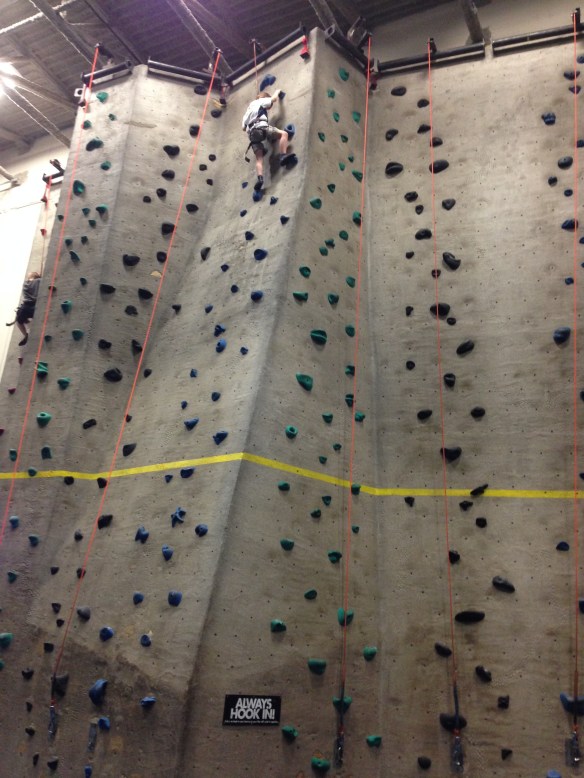ROOS! Doesn’t that sound like a European soccer star, or maybe an adorable cartoon character?
Yesterday sucked. Martin engaged in behaviors we haven’t seen in months, or even years. He was exhausted. He had been chatting incessantly in bed Tuesday night, and cracking himself up, and he didn’t get to sleep until after 10:00 pm, so yesterday morning I had to drag him from bed. (On a proper night, he’s asleep by 8:00 pm.) Getting breakfast into him was a struggle. When his head wasn’t half on his plate and half on his placemat, he still forewent eating in order to whine, “I have to throw up. I can’t go to school, because I’m so sick.” (He didn’t have to, and he wasn’t.)
After school, the situation only got worse. Every suggestion I made was met with, “No! No, no, no, no, no.” He had a meltdown when Neil Young came on the radio singing “Ohio.” I can’t really identify the genesis of the meltdown; it seemed to be some combination of the song being a live version, my insisting on listening to the whole thing, and Neil Young not being available for a concert this weekend in the New York City area. In any event, Martin subsequently said he didn’t want to hear “Jungle Boogie,” asked me to sample every station for a better choice, decided that actually “Jungle Boogie” was what he wanted to hear, and had a fresh meltdown because the song had ended while we were sampling the other stations.
His homework, which usually gets done in less than 10 minutes, took more than 45 minutes and still wasn’t complete when he went to bed. He cried. He said that he couldn’t do the addition problems and needed my help. (He could do them, and he didn’t need help.) He refused to eat dinner unless I spooned it into his mouth. And he talked. Holy cow, did he talk. He talked non-stop, perseverating on tableware and street signs. Once, I regret, I exclaimed, “Martin, please. Please just stop talking for a minute.” He shouted, “No talking? No talking! Mommy, no talking?” and started to cry again.
Adrian is traveling, so Martin and I were alone. Martin decided that he could not be more than a few feet from me, and that I had to respond to everything he said. Everything.
Sound like the kid I’ve been blogging about lately?
I didn’t think so.
ROOS is a term I’ve heard some parents toss around, since I started doing Heilkunst homeopathy with Martin. As I understand homeopathy (when it comes to Heilkunst, I’m still a newbie), we administer teeny-tiny doses of what injured the immune system, or even just teeny-tiny doses of the energy of what injured the immune system, in order to help the body rid itself of the insult. So if the particular insult to be addressed is a bout of coxsackie, we give the participant some of that energy, in the hopes that his immune system will say, “Hey, what is that? I want that out. I want all that out,” in a way that it couldn’t manage when overwhelmed by the original insult.
As part of this process, while the body is working to clear the original insult, some of the symptoms that accompanied that insult. Hence: ROOS, or Return Of Old Symptoms. For the past week or two, Martin has been working to clear the H1N1 vaccine. If the Heilkunst stuff is working—and I think it is—then that H1N1 injection Martin got in late 2009 had something to do with the development of perseveration and overall discomfort. Now let me add something amazing: This seems to be the most difficult clear we’ve had since starting Heilkunst, and the H1N1 vaccine is the only injection that I ever correlated directly with the development of Martin’s autism. Seriously. Almost immediately after he received the H1N1 shot, I noticed Martin, for the first time, start picking up little chairs and setting them in patterns. I didn’t know then that Martin had autism; six more months would pass before we began to realize, and so at the time I just thought, oh, that’s odd, and chalked it up to Martin having an engineer’s mind, an assumption bolstered when he soon developed a fascination with the upright vacuum cleaner. Fast-forward five-and-a-half years. Poor little guy is trying to purge that weird H1N1 injection, and whatever nastiness lurked within its ingredients.
I finally got Martin into bed around 7:40 last night. I tried to read him a book, about the importance of telling the truth (that’s been an issue lately), but it was slow-going. Every line I read sent Martin on a tangent. Bears in the story? “Mommy, are these my stuffed bears? Mommy, what are their names?” A soccer ball? “Mommy, do I play soccer? Mommy, at the JCC is there a sign that says, ‘Gymnasium’?” A store? “Mommy, at the store, do they have plates and forks and knives? Why?”
Fortunately, he fell asleep promptly. I decided to cut my losses on the day. I cancelled a 9:00 pm business call instead cleaned the kitchen—which I find relaxing; don’t judge!—while engaging in hockey-watching therapy. Tampa Bay and Detroit were playing Game 7 of their first-round series. I don’t care for either team, other than a preference for Detroit because it’s an Original Six team and located in a climate appropriate for playing ice hockey. On the other hand, Brian Boyle and Ryan Callahan, former Rangers whom I still love, both play for Tampa Bay now, and I was happy to see a victory for them.
I went to bed thinking about Rangers’ game coming up tonight, and imagining that ROOS indeed could be just an adorable cartoon character.


